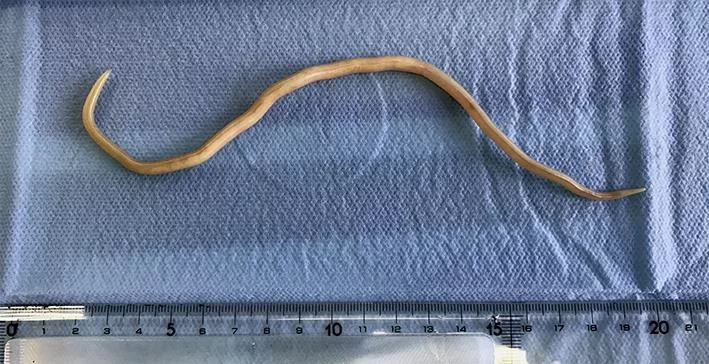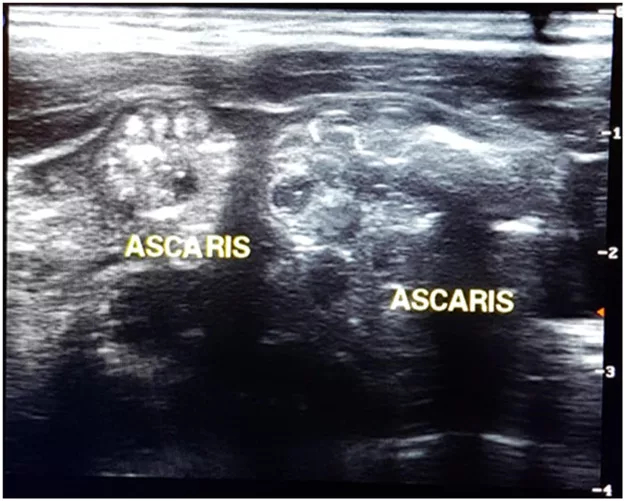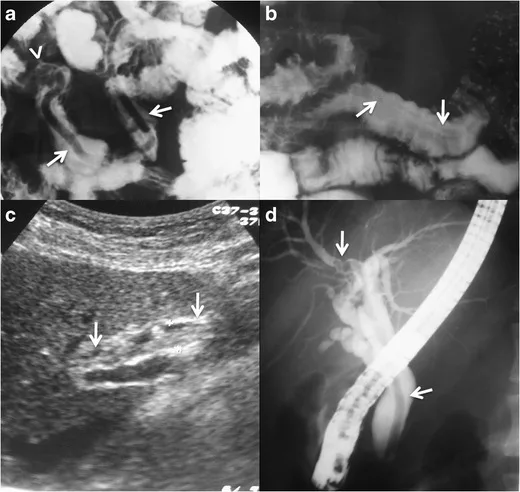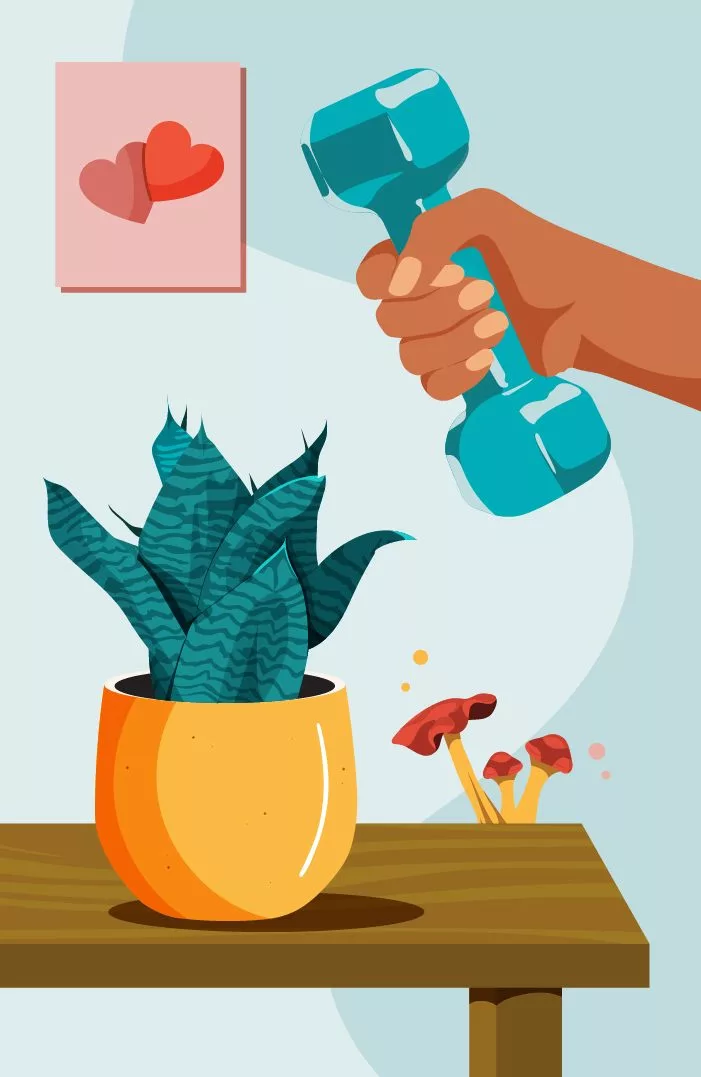Ascariasis is a helminthic parasitic infection caused by the roundworm Ascaris lumbricoides. The pathogenic worm affects the small intestine and may lead to symptoms like diarrhea (occasional), stomach pain, etc. Mostly asymptomatic, ascariasis may present with gastrointestinal issues. Very rarely, it can cause respiratory trouble in patients. Humans acquire the worm by consuming contaminated food or water. Hand-to-mouth contact with roundworm eggs is another cause of transmission. The disease is very common in developing countries. According to reports, the global prevalence of the worm disease was estimated to be 11%.1Holland, C., Sepidarkish, M., Deslyper, G., Abdollahi, A., Valizadeh, S., Mollalo, A., … & Rostami, A. (2022). Global prevalence of Ascaris infection in humans (2010–2021): a systematic review and meta-analysis. Infectious diseases of poverty, 11(1), 113. Prevalence is greater in young patients (below 5 years). Doctors treat the disease mainly with anti-parasitic medications (albendazole, etc.).
Types Of Ascariasis
Based on the causative agent (Ascaris species), ascariasis disease is divided into two types:
- Caused by the human roundworm, i.e., Ascaris lumbricoides
- Caused by the pig roundworm, i.e., Ascaris suum
Ascariasis Symptoms
In the vast majority of cases, ascariasis is asymptomatic. However, when present, the following symptoms are seen:
Abdominal Pain & Swelling
Individuals suffering from roundworm infection experience abdominal discomfort. However, many patients complain of recurrent abdominal pain (that comes and goes). Abdominal distention and bloating may also accompany discomfort.2Leung, A. K., Leung, A. A., Wong, A. H., & Hon, K. L. (2020). Human ascariasis: an updated review. Recent patents on inflammation & allergy drug discovery, 14(2), 133-145. Most patients describe the abdominal pain to be severe and radiating across the body. The pain responds to changes in position (usually worsens with any movement).
Anorexia & Weight Loss
Ascariasis-induced loss of appetite (or decreased food intake) is a significant symptom in young patients. This helminthic infection increases the chances of malnutrition/undernutrition in children.3Djohan, P. B., Prasetyadi, A., Wirjanata, M., Widjanarko, N. D., Hengky, A., Wijaya, E., & Astiarani, Y. (2023). Association between Ascaris lumbricoides infection and undernutrition in children: a systematic review and meta-analysis. Bali Medical Journal, 12(1), 197-205. Unexplained weight loss with other symptoms can point towards an underlying roundworm infection.
Infestation with the worm can lead to biliary obstructions (blockage of the bile ducts). Bile is important for proper digestion, so these obstructions lead to poor digestive activities. Thus, patients report loss of appetite and consequent weight loss. A 37-year-old lady lost 5kgs in just one month due to the disease.4Kolleri, J. J., Thabet, A. M., Mohammedain, S., Sajid, S., Ahmed, Z., & Momin, U. (2023). A Case Report on Biliary Ascariasis. Cureus, 15(1).
Diarrhea
Chronic diarrhea is seen in a number of parasitic infections, including amoebiasis, ascariasis, and giardiasis.5Khurana, S., Gur, R., & Gupta, N. (2021). Chronic diarrhea and parasitic infections: Diagnostic challenges. Indian Journal of Medical Microbiology, 39(4), 413-416. Diarrhea and abdominal pain make it to the list of ascariasis abdominal complications in childhood.6Siviero, I., Almeida, U. V. D., Penna, C. R., Puglia, E. B. D., & Simoes, B. C. B. (2024). Abdominal complications of ascariasis in childhood. Jornal de Pediatria, 100(5), 460-467.
Several patients face intermittent or occasional diarrhea. There are alterations in the symptoms that may be attributed to hepatobiliary obstructions caused by the worm.7Fayisa, S. T., Hailu, S. S., & Abebe, A. T. (2024). Ascariasis: A common disease with uncommon presentation in a resource-limited setting. A case report. Radiology Case Reports, 19(4), 1560-1564. Occasional diarrhea is a unique presentation of ascariasis.8Ahmed, M. (2023). Intestinal parasitic infections in 2023. Gastroenterology Research, 16(3), 127. Patients may also experience anemia.
Nausea & Vomiting
As there is gastrointestinal involvement, nausea and vomiting are seen in a number of cases. Nausea and vomiting are usually the initial symptoms of the disorder.
Respiratory Symptoms
When respiratory issues are present, healthcare professionals observe pneumonia-like symptoms in the early stages of the disease. Symptoms usually appear 5-26 days after ingestion of eggs. The most commonly encountered symptoms include cough and wheezing. Shortness of breath may accompany these issues. Immunodeficient patients may even succumb to respiratory failures due to respiratory complications of ascariasis. 9Aleksandra, L., Barbara, Z., Natalia, L. A., Danuta, K. B., Renata, G. K., & Ewa, M. L. (2016). Respiratory failure associated with ascariasis in a patient with immunodeficiency. Case Reports in Infectious Diseases, 2016(1), 4070561.
Recent studies conclude that, though rare, pleural ascariasis (pleural space ascariasis infection) can lead to serious symptoms. A 45-year-old male patient reported chest pain, bloody cough, and breathlessness at the ER. Investigations revealed the presence of A. lumbricoides worms in the chest drain. The patient was successfully treated with anti-parasitic medicine (albendazole). Thus, the study advises medical professionals to be aware of the respiratory complications of ascariasis.10Mohammed, N. A., Adam, A. O., Osman, M. A. H., Abass, H. M., Salih, A. M., Abaker, A. A., … & Magoub, M. (2024). Unusual Presentation of Pleural Space Ascariasis Infection from Eastern Sudan: A Case Report. Research and Reports in Tropical Medicine, 73-78.
The myriad of symptoms can interfere with the patient’s generalized health. Thus, many patients are restless throughout the day and have trouble sleeping at night.
Ascariasis Causes
Once inside, the A. lumbricoides roundworm quickly replicates to invade different organs. The parasite relies on a hospitable environment for growth, which is present only in a human host. The lifecycle of the ascaris worm is discussed below:

- The worm is ingested as eggs, which pass through your gut and hatch in the intestine. An adult roundworm female can lay more than 20,000 eggs in a day.
- From there, the larvae move through the blood (or the lymph) into your lungs. It stays in the lungs for about two weeks.
- After affecting the lungs, the mature roundworms travel to the throat. Therefore, patients often cough out worms in their sputum. Some of these roundworms are expelled via the cough, while others are swallowed.
- The worms then pass through the gut and hatch in the intestine, and the cycle continues. Thus, patients excrete eggs through the feces.
Is Ascariasis Contagious?
Yes, Ascariasis is contagious. You can contract the disease if you ingest the eggs of human roundworms. As mentioned, an infected person continues to release the worm eggs in his/her feces and cough contents.
The eggs in the poop are capable of surviving extreme weather. However, it may take several weeks for the eggs (in the feces) to be strong enough to cause infection in humans. Once they gain the ability, the worm can remain infective for up to 17 months (or even more).
Ascariasis Transmission:
The eggs are present in:
- Soil contaminated with A. lumbricoides
- Human feces
- Cough (and vomit)
- Uncooked food contaminated by infested soil
The disease is transmitted to you if you consume water or food contaminated with eggs. Toddlers (and children below 8 years of age) who are habitual in playing in the soil or mud can also fall prey to the disease through hand-to-mouth contact (if the soil has eggs).
Risk Groups:
- Residents of tropical and sub-tropical regions (Latin America and Sub-Saharan Africa)
- People living in areas with poor sanitation and clean water supply.
- People who consume foods from fields where human feces (or pig poop) is used as fertilizer.
How To Diagnose Ascariasis?
After taking the history of your symptoms, your doctor may ask about your travel history (to tropical/sub-tropical regions). The doctor may take help from several diagnostic and imaging tests.

Diagnostic Tests:
Stool Sample
Ascariasis diagnosis relies on obtaining body excretions. In suspected cases, doctors collect a sample of stool and send it to the lab to check for worms. In most cases, a stool test is sufficient to diagnose active ascariasis. The Kato-Katz method of stool testing is the “gold standard” of soil helminths’ detection.11Bosch, F., Palmeirim, M. S., Ali, S. M., Ame, S. M., Hattendorf, J., & Keiser, J. (2021). Diagnosis of soil-transmitted helminths using the Kato-Katz technique: What is the influence of stirring, storage time, and storage temperature on stool sample egg counts? PLoS Neglected Tropical Diseases, 15(1), e0009032.
Blood Test
Some experts now suggest conducting a blood test to check eosinophil levels in the body. Eosinophilia (raised eosinophil levels) indicates roundworm infection but it can not be used as an alternative to the stool test.12Rahmat, S. M., Panggabean, M., Depari, A. A., & Endalif, D. (2023). Diagnostic Test of Blood Eosinophil Level as a Marker of Ascaris lumbricoides Infection. Indonesian Journal of Tropical and Infectious Disease, 11(2), 85.
Imaging Tests:
X-rays
In some cases, chest X-rays of infected persons have small, round, and dense shadows. The shadows are irregular in shape and may be large in size (in some cases). Sometimes, worms can be seen in plain intestinal radiographs.
Fluoroscopy
Barium studies reveal A. lumbricoides worms as longitudinal tube-like structures. If the GIT is empty, the worms appear as a filling defect (a mass that disrupts the normal structure of the intestine). Sometimes, doctors may need to perform an endoscopy to visualize the intestines.
Other scans that can produce detailed images of the roundworm include:
- Ultrasounds
- CT Scans
- MRIs

Differential Diagnosis:
Appendicitis
Differentiating between the cause of abdominal pain and cramping in pediatric patients can be tricky. Healthcare professionals can confuse ascariasis with appendicitis. Therefore, experts advise doctors to be cautious and adopt a comprehensive approach while dealing with pediatric patients.13Aalinezhad, M., Jafarpishe, M. S., Naderi, Y., Shahsavan, M., & Souri, Z. (2024). Coincidence of Ascariasis with Appendicitis in a Pediatric Patient with Abdominal Pain; a Case Report. Archives of Academic Emergency Medicine, 12(1).
In the recent past, doctors have noticed an unusual association between appendicitis and ascariasis infection. A 7-year-old boy presented to the ER with intense abdominal pain, nausea/vomiting, anorexia, etc. After proper diagnosis, he was treated with appendicectomy. Astonishingly, on further examination, doctors found A. lumbricoides parasite inside the appendix lumen. Therefore, the study concluded that ascariasis can be an unusual cause of appendicitis.14Ruelas-Contreras, C. H., & Caballero-Concha, E. (2023). Ascaris lumbricoides, an uncommon cause of appendicitis. International Surgery Journal, 10(11), 1818-1819. Similarly, in another case, the ascariasis worm was accidentally found during the appendectomy procedure.15Ghaedi, M., Pourdavood, A. H., Haghbeen, M., Sepidkar, A. A., Foroughian, M., Etezadpour, M., & Taheri, L. (2020). Ascaris worm incidentally found during the appendectomy: A case report of Parasitic Appendicitis. International Journal of Medical Investigation, 9(3), 76-80.
Ascariasis Treatment
Antiparasitic medicines are the mainstay of the treatment. Doctors generally prescribe medicines for 1 to 3 days in adults. The good thing is that the resolution of symptoms is quick, and most people start feeling better quickly. Research shows that antihelmintic drugs like albendazole and mebendazole have high effectiveness and efficacy.16Hon, K. L., & Leung, A. K. (2024). An update on the current and emerging pharmacotherapy for the treatment of human ascariasis. Expert Opinion on Pharmacotherapy (just accepted). Both drugs are safe and effective, but when compared with others, mebendazole has fewer side effects.17Hon, K. L., & Leung, A. K. (2024). An update on the current and emerging pharmacotherapy for the treatment of human ascariasis. Expert Opinion on Pharmacotherapy (just accepted).
Ivermectin is another anti-helmintic drug frequently used in ascariasis treatment.18Le, B., Clarke, N. E., Legrand, N., & Nery, S. V. (2024). Effectiveness of ivermectin mass drug administration in the control of soil-transmitted helminth infections in endemic populations: a systematic review and meta-analysis. Infectious Diseases of Poverty, 13(01), 1-15. Latest clinical studies reveal that a single dose of ivermectin shows promising results in treating ascariasis. However, this very drug is inefficient for hookworm infections.19Yahia, S., Ahmed, A., Alshafey, M., & Moawad, H. (2022). Comparing the anti-parasitic effect of Ivermectin versus Albendazole against intestinal nematode worms. Parasitologists United Journal, 15(2), 165-173. Pyrantel pamoate may be prescribed to pregnant women suffering from human roundworm infection.
In rare instances, doctors may need to repair the bowel obstruction caused by ascariasis infection surgically. Most surgeons opt for a minimally invasive procedure, i.e., endoscopic retrograde cholangiopancreatography (ERCP), for this purpose.
Ascariasis Prevention
When traveling to roundworm prevalent area, you should take the following precautions to prevent ascariasis:

- Frequently wash your hands (make sure your kids wash their hands, too!) and don’t touch the soil with bare hands.
- Be cautious when consuming food. Don’t eat undercooked meat or raw vegetables or fruits. Wash and peel all fruits and vegetables.
- Try to use proper sewage disposal.
Final Word
Ascariasis is a parasitic infection caused by the Ascaris lumbricoides (human roundworm). Humans acquire the disease when they ingest worm eggs that hatch, replicate, and spread inside the body. Once inside, the roundworm mainly targets the lungs and intestines, leading to GIT symptoms like nausea, vomiting, abdominal pain, and occasional diarrhea. Patients also report anemia and weight loss. Shortness of breath and coughing constitute respiratory symptoms of the disease.
Infected persons continue to release eggs in stool and cough, making it a contagious disease. Children who play with soil may get the disease through hand-to-mouth contact. Usually, a microscopic analysis of the stool sample is sufficient to diagnose ascariasis. Barium fluoroscopic examination shows worms inside the intestinal lumen. Treatment involves anti-parasitic medicines like albendazole and mebendazole for 1-3 days. You can stay safe by frequently washing your hands and eating clean items (fruits, vegetables, etc.).
Refrences
- 1Holland, C., Sepidarkish, M., Deslyper, G., Abdollahi, A., Valizadeh, S., Mollalo, A., … & Rostami, A. (2022). Global prevalence of Ascaris infection in humans (2010–2021): a systematic review and meta-analysis. Infectious diseases of poverty, 11(1), 113.
- 2Leung, A. K., Leung, A. A., Wong, A. H., & Hon, K. L. (2020). Human ascariasis: an updated review. Recent patents on inflammation & allergy drug discovery, 14(2), 133-145.
- 3Djohan, P. B., Prasetyadi, A., Wirjanata, M., Widjanarko, N. D., Hengky, A., Wijaya, E., & Astiarani, Y. (2023). Association between Ascaris lumbricoides infection and undernutrition in children: a systematic review and meta-analysis. Bali Medical Journal, 12(1), 197-205.
- 4Kolleri, J. J., Thabet, A. M., Mohammedain, S., Sajid, S., Ahmed, Z., & Momin, U. (2023). A Case Report on Biliary Ascariasis. Cureus, 15(1).
- 5Khurana, S., Gur, R., & Gupta, N. (2021). Chronic diarrhea and parasitic infections: Diagnostic challenges. Indian Journal of Medical Microbiology, 39(4), 413-416.
- 6Siviero, I., Almeida, U. V. D., Penna, C. R., Puglia, E. B. D., & Simoes, B. C. B. (2024). Abdominal complications of ascariasis in childhood. Jornal de Pediatria, 100(5), 460-467.
- 7Fayisa, S. T., Hailu, S. S., & Abebe, A. T. (2024). Ascariasis: A common disease with uncommon presentation in a resource-limited setting. A case report. Radiology Case Reports, 19(4), 1560-1564.
- 8Ahmed, M. (2023). Intestinal parasitic infections in 2023. Gastroenterology Research, 16(3), 127.
- 9Aleksandra, L., Barbara, Z., Natalia, L. A., Danuta, K. B., Renata, G. K., & Ewa, M. L. (2016). Respiratory failure associated with ascariasis in a patient with immunodeficiency. Case Reports in Infectious Diseases, 2016(1), 4070561.
- 10Mohammed, N. A., Adam, A. O., Osman, M. A. H., Abass, H. M., Salih, A. M., Abaker, A. A., … & Magoub, M. (2024). Unusual Presentation of Pleural Space Ascariasis Infection from Eastern Sudan: A Case Report. Research and Reports in Tropical Medicine, 73-78.
- 11Bosch, F., Palmeirim, M. S., Ali, S. M., Ame, S. M., Hattendorf, J., & Keiser, J. (2021). Diagnosis of soil-transmitted helminths using the Kato-Katz technique: What is the influence of stirring, storage time, and storage temperature on stool sample egg counts? PLoS Neglected Tropical Diseases, 15(1), e0009032.
- 12Rahmat, S. M., Panggabean, M., Depari, A. A., & Endalif, D. (2023). Diagnostic Test of Blood Eosinophil Level as a Marker of Ascaris lumbricoides Infection. Indonesian Journal of Tropical and Infectious Disease, 11(2), 85.
- 13Aalinezhad, M., Jafarpishe, M. S., Naderi, Y., Shahsavan, M., & Souri, Z. (2024). Coincidence of Ascariasis with Appendicitis in a Pediatric Patient with Abdominal Pain; a Case Report. Archives of Academic Emergency Medicine, 12(1).
- 14Ruelas-Contreras, C. H., & Caballero-Concha, E. (2023). Ascaris lumbricoides, an uncommon cause of appendicitis. International Surgery Journal, 10(11), 1818-1819.
- 15Ghaedi, M., Pourdavood, A. H., Haghbeen, M., Sepidkar, A. A., Foroughian, M., Etezadpour, M., & Taheri, L. (2020). Ascaris worm incidentally found during the appendectomy: A case report of Parasitic Appendicitis. International Journal of Medical Investigation, 9(3), 76-80.
- 16Hon, K. L., & Leung, A. K. (2024). An update on the current and emerging pharmacotherapy for the treatment of human ascariasis. Expert Opinion on Pharmacotherapy (just accepted).
- 17Hon, K. L., & Leung, A. K. (2024). An update on the current and emerging pharmacotherapy for the treatment of human ascariasis. Expert Opinion on Pharmacotherapy (just accepted).
- 18Le, B., Clarke, N. E., Legrand, N., & Nery, S. V. (2024). Effectiveness of ivermectin mass drug administration in the control of soil-transmitted helminth infections in endemic populations: a systematic review and meta-analysis. Infectious Diseases of Poverty, 13(01), 1-15.
- 19Yahia, S., Ahmed, A., Alshafey, M., & Moawad, H. (2022). Comparing the anti-parasitic effect of Ivermectin versus Albendazole against intestinal nematode worms. Parasitologists United Journal, 15(2), 165-173.

